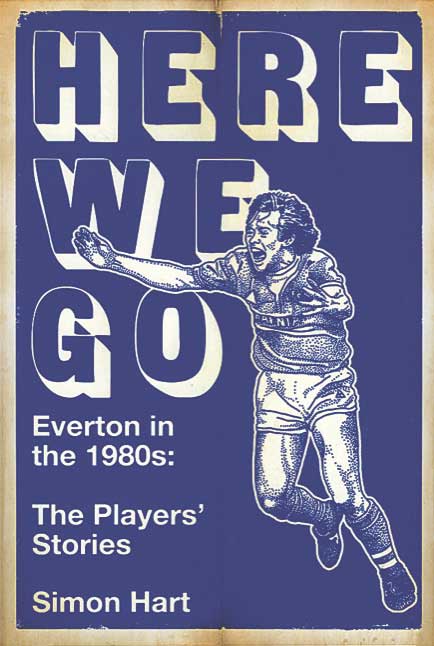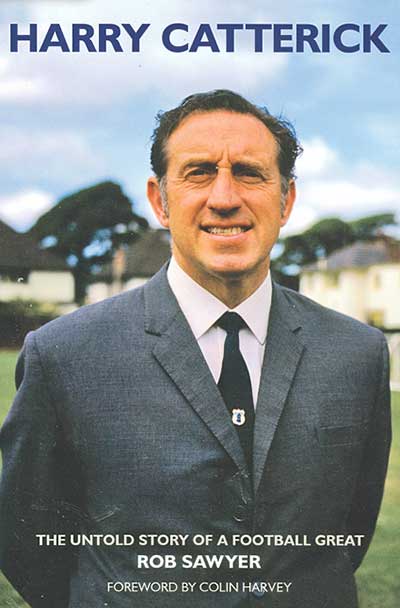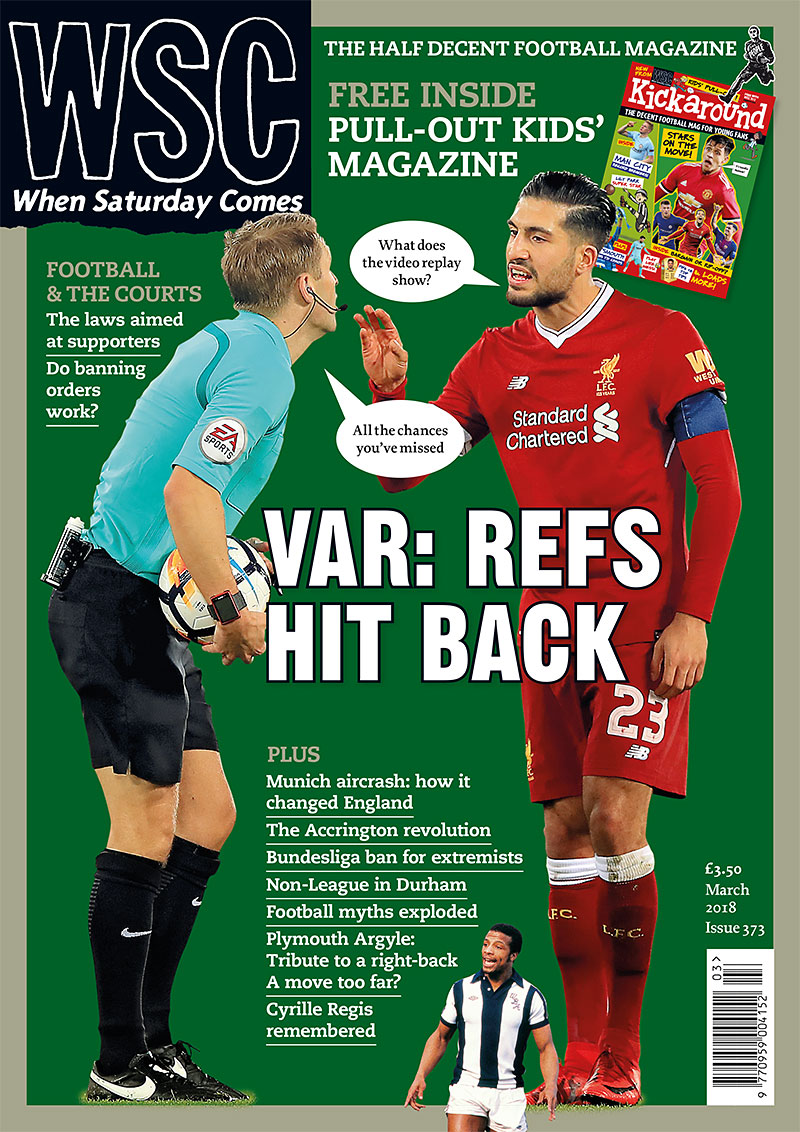Search: 'Howard Kendall'
Stories
The greatest non-League FA Cup run of the past 100 years – until this season – could have been even better. In WSC 218 Ken Sproat explained why
 Everton in the 1980s
Everton in the 1980s
by Simon Hart
De Coubertin Books, £18.99
Reviewed by Jamie Rainbow
From WSC 357 November 2016
Simon Hart’s book consists of 13 in-depth interviews with many of the key figures that formed Everton’s great team of the 1980s. This period of footballing success for both Liverpool clubs coincided with a turbulent time when football provided a welcome release from the city’s acute economic and social problems. It’s a facile theory perhaps, but one grounded in reality and one the Everton players took at face value. It’s to Hart’s credit that he weaves a poignant narrative through these interviews without succumbing to undue sentimentality.
 The untold story
of a football great
The untold story
of a football great
by Rob Sawyer
De Coubertin Books, £18.99
Reviewed by Simon Hart
From WSC 340 June 2015
It was 30 years ago in March that Harry Catterick died after suffering a heart attack at Everton’s FA Cup quarter-final against Ipswich Town. Five years earlier, Dixie Dean had also died at Goodison Park yet unlike the nationally famous striker, Catterick’s achievements – building two League title-winning teams – are today largely ignored beyond Merseyside.
Rob Sawyer has sought to redress the balance in a well-crafted biography that begins with a foreword from Colin Harvey, part of Catterick’s 1970 Championship side. “Don Revie, Bill Shankly, Bill Nicholson and Sir Matt Busby all get mentioned as being the great managers of the era while Harry doesn’t,” says Harvey of a man who won as many Leagues and FA Cups as Revie.
It is with Shankly, though, that Harvey makes the most telling comparison. For half of his 12-year reign, Catterick’s Everton drew the bigger crowds on Merseyside yet as Harvey recalls: “The press enjoyed being courted by Bill Shankly, but Harry was an introvert and snubbed them.” This is the crux of his image problem. Here was somebody who refused to allow the BBC cameras in to film Match of the Day until 1967 and had none of the charisma of his rival. Catterick was an aloof figure more akin to a modern-day director of football who – as his players would joke – put on a tracksuit only when the TV cameras or chairman John Moores appeared.
To achieve this insightful portrait, Sawyer pieced together interviews given by Catterick himself along with reminiscences of players and journalists and contemporary press cuttings. Alex Young recalls the coldness of a man not interested in courting popularity, saying: “I never got a pat on my head.” He had a devious side too, lying to the press and his own players; he told midfielder Brian Harris, for instance, that rumours of Tony Kay joining were false, only to swoop later that day for a player who had helped his Sheffield Wednesday side finish Division One runners-up in 1960-61.
Yet while his 1963 title-winners, built with the largesse of Littlewoods tycoon Moores, were dubbed “cheque-book champions”, the vision behind his youthful 1970 team would fit most current ideas of how to play the game. It was a 4-3-3 formation with the “holy trinity” of midfielders Howard Kendall, Harvey and Alan Ball at its heart. Dave Sexton, then Chelsea manager, applauded him for succeeding with a “set of small players up front” and Catterick’s own view was: “When it comes to the creation of something in tight corners, which midfield men have to do, give me the little ones.”
His players might have endured an old-fashioned factory-style clocking-in system but his planning of Everton’s Bellefield training ground – with an indoor pitch for small-sided matches – was another demonstration of foresight. Indeed in October 1970 Charles Buchan’s Football Monthly magazine dubbed the then 50-year-old “a manager for the Seventies”.
Sadly for Catterick – and his legacy – his Everton team soon fell apart. Sawyer recalls a pivotal week in March 1971 when they lost a European Cup quarter-final to Panathinaikos and FA Cup semi-final to Liverpool. After Ball left in controversial circumstances and Catterick himself suffered a heart attack, he was sacked in 1973. Not until 1985, two months after his death, would Everton win the League title again.
 My life from left field
My life from left field
by Kevin Sheedy
SportMedia, £14.99
Reviewed by Mark O’Brien
From WSC 332 October 2014
Paul McGrath and Tony Cascarino’s autobiographies are renowned as two of the most caustic and revealing footballing books in recent times. Their former Republic of Ireland international team-mate Kevin Sheedy has written his life story now but anyone expecting soul searching in the same vein as Back From The Brink or Full Time is likely to be disappointed.
Sheedy’s story is told in a fashion that could most politely be described as “breezy”. From a youngster at Hereford to a bit-part player at Liverpool before becoming a key part in the all-conquering Everton side of the mid-1980s – then rounding off his playing career at Newcastle United and Blackpool – it’s all dealt with in the same cheery, almost matter-of-fact fashion.
It’s quite an old-school approach, even throwing in some “any other business” chapters near the end, where Sheedy gives his opinions on the perils of social media facing today’s young players and picks a best XI from his former Everton and Ireland team-mates. Among that throwaway page-filler then it’s a shock to come across a section which deals with his recent treatment for bowel cancer. A more modern style might have made that the touchstone for the whole book, reflecting on his career in the light of the grave news of his illness, but maintaining the light-hearted tone Sheedy concentrates instead on a nurse pulling back the sheets following his operation and declaring: “Oh my god, they’ve cut your cock off!”
He comes across as a thoroughly nice fella then, but it feels like a bit of a missed opportunity. While Evertonians have probably read just about everything it’s possible to know about Rotterdam and the League wins under Howard Kendall, Sheedy was privy to the break-up of that great side and the start of the club’s decline and it would have been illuminating to know more about that process. He was in fact part of an infamous incident that is seen as emblematic of the chaos that reigned at Goodison during Kendall’s second spell in charge, when he had a fight with Martin Keown in a Chinese restaurant. He brushes it aside though, blaming his behaviour on the fact that he was unaware that the players had been buying him glasses of wine when normally he only drank it with soda. Seems plausible.
He tells his own collection of Jack Charlton anecdotes too – the Ireland manager left him out of a squad altogether for a match and then added insult to injury by trying to send him on as a sub – and the Italia 90 section is probably the best bit of the book.
The title, by the way, refers to an incident at Goodison in March 1985. Sheedy lashed a free-kick past Ipswich’s Paul Cooper and into the top-right corner. When ordered to be retaken he simply placed it in the top left. So good he did it twice. Unfortunately though, once is more than enough when it comes to reading his book.
